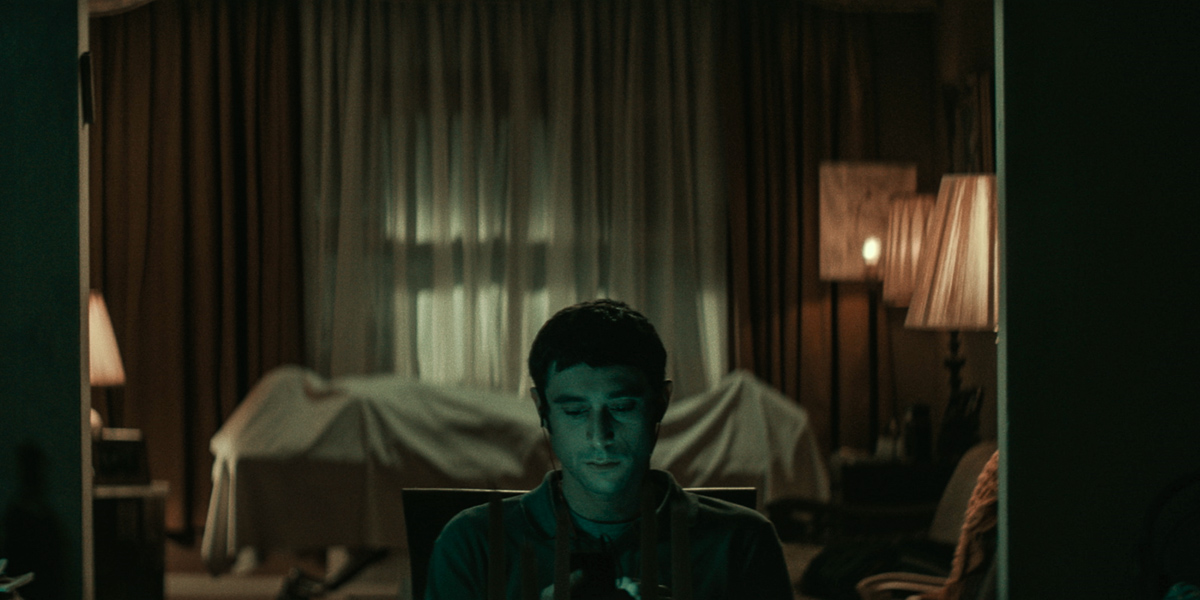There’s a fundamental rule with horror films that rarely gets followed: loud doesn’t equal scary. Sound should be seen as a tool used to build tension and strengthen scares, but too many movies think it’s a matter of swinging the tool as hard as they can. Sometimes this can work out fine, like with James Wan’s funhouse horrors Insidious and The Conjuring, both of which have a finesse in the way it uses sound as a weapon. But in the case of Keith Thomas’ debut The Vigil it feels like a sonic bludgeoning, backed up by a poorly directed and written attempt to generate depth out of very little.
Taking place over one night in Brooklyn’s Hasidic community, The Vigil begins with an explanation for those less familiar with some of the religion’s traditions. Title cards detail the term shomer, which refers to someone made to keep watch over a recently deceased person. We then see Yakov (Dave Davis) at a support meeting for people like him who have abandoned the faith, only to be approached afterward by someone offering him money to watch over the body of someone known for being a hermit. He accepts, staying the night in the deceased’s home with his frail, dementia-suffering wife (Lynn Cohen). But soon after Yakov starts his watch, he discovers that a demon has latched itself to him, refusing to let him leave and making him relive his past traumas repeatedly.
There’s an idea here involving intergenerational trauma within the Jewish community. The demon terrorizing Yakov was attached to the man whose body he’s now looking after, which flashbacks imply was a result of surviving Nazism before coming to America. This plays well into the earlier sections, where Thomas takes his time establishing the interior of the house most of the film takes place in, along with building up tension before the demon finally shows itself. But when Yakov first encounters it directly, we get a blurry image of a hand coming out of the dark with deafening strings blaring on the soundtrack. It exposes the film as light on genuine scares, and the bluntness implies what’s to come with how Thomas handles his ideas.
And where The Vigil ends up with those ideas is pretty much nowhere. After all of the build-up and establishment in the earlier sections, Yakov ends up having to embrace the religion he’s been trying to get away from. A series of nightmare sequences set up the tragic event that made Yakov hack it out on his own, but the section of the film dedicated to Yakov overcoming the demon is over before it even begins. A scene where he dons a tefillin, faces the demon in candlelight and recites a prayer is all it takes, apparently. It’s such a poorly designed and directed climax it’s easy to wonder why, if this threat were so easy to defeat, nobody thought of fighting this thing with prayer for the last seven or so decades.
If there’s anything going for The Vigil, it’s the setting. Aside from the title cards at the start, Thomas doesn’t spend much time giving exposition about the community he’s focusing on, which works to the film’s benefit for the most part. But no matter how much cultural specificity one can put in their film, it doesn’t mean much if the direction is too broad. The Vigil undermines its own stakes through a punishing sound design, lack of actual frights, and a reductive character arc. By the time we get to the ending, a happy one with a little bit of sinister ambiguity, the only feeling it generates is relief that our ears can finally take a rest.
The Vigil premiered at the Toronto International Film Festival.

